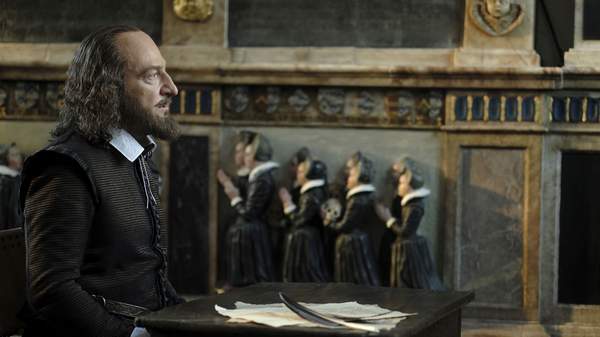Overview
Last time that Kenneth Branagh took on a cultural icon, he stepped into Hercule Poirot's shoes, starring in and directing a new adaptation of Agatha Christie's Murder on the Orient Express. He'll return to the character in next year's Death on the Nile, continuing a filmmaking career with a noticeable theme: bringing famous figures and stories to the screen. Mary Shelley's Frankenstein, Mozart's opera The Magic Flute, Marvel's initial Thor flick and fairy tale Cinderella all appear on his resume, however one particular chap has always retained pride of place. Thirty years ago, Branagh jumped behind the camera for the first time for a cinematic version of William Shakespeare's Henry V. In the decades since, he's directed and acted in Much Ado About Nothing, Love's Labour's Lost and As You Like It, too. So it was only a matter of time until he did the obvious, turning his attention to a Shakespeare biopic.
Shakespeare in Love, this isn't. Shakespeare in Retirement would've worked as a title, though. With Branagh both starring and helming as he usually does, All Is True's take on the Bard sees him back in Stratford-upon-Avon, where his family has always lived while he's been triumphing in London. It took a fire to bring him home, with his beloved Globe Theatre burning down in 1613 during a performance of Henry VIII. Devastated, old Will has pledged never to work again, vowing to spend time with his wife Anne Hathaway (Judi Dench) and adult daughters Susanna (Lydia Wilson) and Judith (Kathryn Wilder) instead. Alas, absence hasn't exactly made the heart grow fonder.
As Shakespeare switches from penning flowery prose to trying to make a garden blossom, drama still keeps finding him. Grief rears its head, over the son he lost years ago, while Anne's stoic sadness at being left to take care of the household also bubbles to the fore. So does Judith's simmering anger at being constantly overlooked due to her gender, as well as Susanna's gossiped-about troubles with her fiercely Puritan husband (Hadley Fraser). If being a genius isn't easy, living in the shadow of one is a much tougher feat. Still, in a reflective screenplay written by Ben Elton, it's Shakespeare's struggle to not only adjust to an ordinary life, but to weigh up his flaws and failings over the course of his life, that drives the film.
In a movie filled with allusions to its subject's work, All Is True takes its name from the alternative moniker for Henry VIII, which would prove Shakespeare's last play. Elton's script is definitely fictionalised — although perhaps less than his recent British sitcom, Upstart Crow — and yet the eponymous phrase remains apt. At the heart of the handsomely shot feature sits an important notion that applies not only to the Bard, but to art in general: whatever unfurls on the page or stage speaks to something within its creator. Just as Shakespeare clearly resonates with both Branagh and Elton, the great playwright's acclaimed words were borne of his own emotions. Sure, All Is True includes one of those typically grating moments where a character utters its title in dialogue (no prizes for guessing who does the honours), however in painting a portrait of the Bard as a conflicted, haunted man, it conveys both the inner source and hefty toll of his output.
In the acting stakes, Branagh makes for a melancholic later-in-life Shakespeare, repeatedly digging his hands into the earth as he grapples with being brought back to normality. Leading quietly, sensitively but commandingly even under a pronounced prosthetic nose, he's matched by the steely Wilder, a great stint of comic sneering by Alex Macqueen as one of the Bard's naysayers, and a witty appearance by Ian McKellen as the writer's long-term patron, the Earl of Southampton. And yet, while buoyed by strong performances and making good on its premise, the film always plays like a minor ode rather than a major work. Walking in the footsteps of greatness is a difficult task, as the movie makes plain, although Branagh has been trying for decades. With All Is True, he shows why — and demonstrates that passion, intelligence and enthusiasm can go a considerable way.
